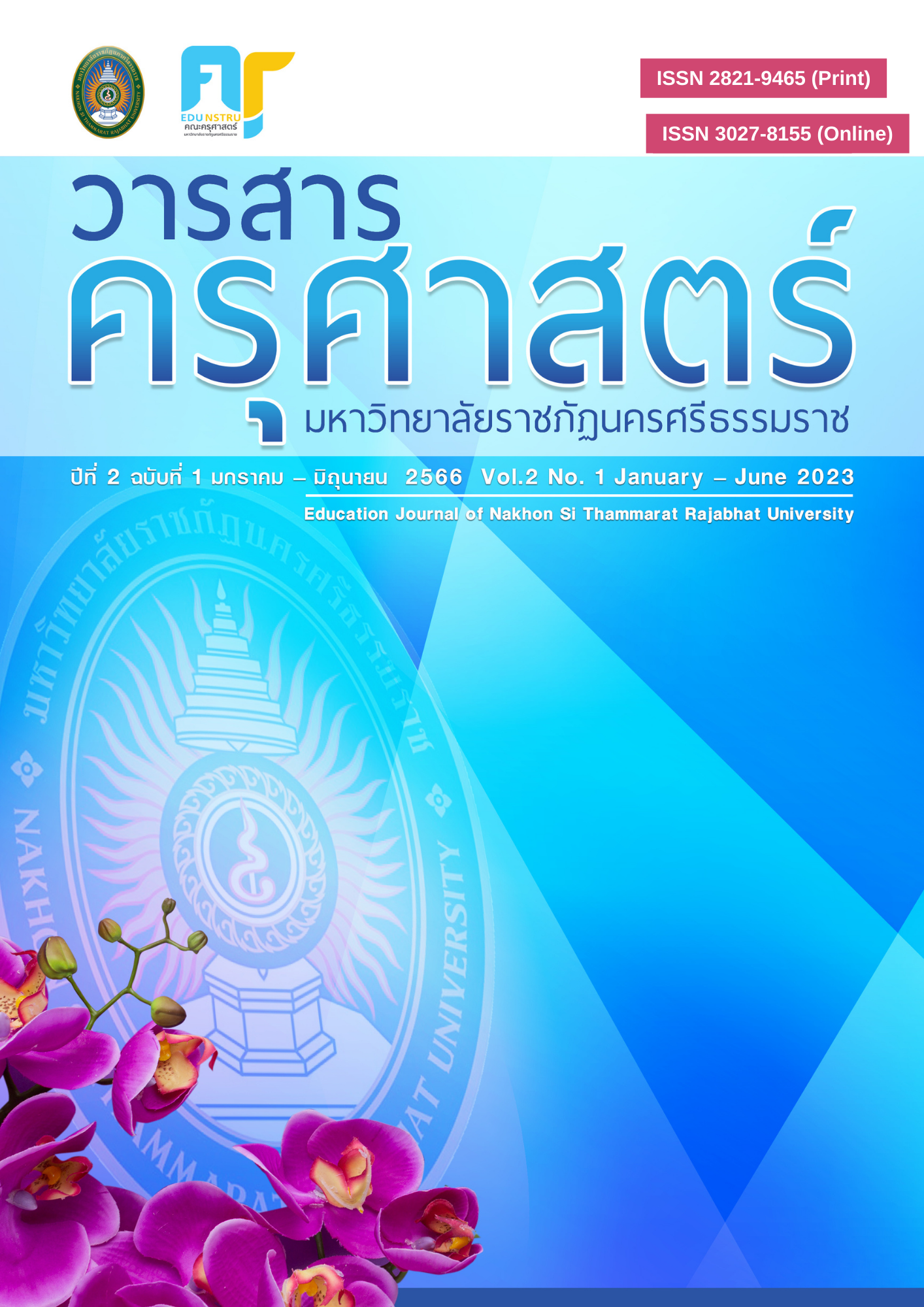[RETRACTED ARTICLE] Reducing the Learning Loss of Thai Students from Online Teaching and Learning in the Covid-19 Pandemic by Using Classroom Action Research
Main Article Content
Abstract
This article has been retracted at the request of the Editor-in-Chief.
Reason for retraction: The authors have plagiarized part of a paper that had already appeared in Mahidol University's Integrated Social Science Journal, 2022, Vol. 9 No. 1, pp. 71–86. One of the conditions of submission of a paper for publication is the authors must certify that the submitted works are new and have never been published elsewhere. The authors must cite the works of others if those works are used in their own works, including preparing a reference list at the end of the articles. and the authors must not plagiarize the works of others. The academic community maintains stringent standards regarding such matters, and we extend our apologies to the journal's readership that this issue was not detected during the submission process.
The Editor apologizes to the readership for any inconvenience caused.
Article Details

This work is licensed under a Creative Commons Attribution-NonCommercial-NoDerivatives 4.0 International License.
บทความที่ได้รับการตีพิมพ์เป็นลิขสิทธิ์ของวารสารครุศาตร์ มหาวิทยาลัยราชภัฏนครศรีธรราช
ข้อความที่ปรากฏในบทความแต่ละเรื่องในวารสารวิชาการเล่มนี้เป็นความคิดเห็นส่วนตัวของผู้เขียนแต่ละท่านไม่เกี่ยวข้องกับวารสารครุศาสตร์ มหาวิทยาลัยราชภัฏนครศรีธรรมราช
References
งานโรคติดต่ออุบัติใหม่ กลุ่มพัฒนา วิชาการโรคติดต่อ. (2564). สถานการณ์โรคติดเชื้อไวรัสโคโรนา 2019 (COVID19) มาตรการสาธารณสุข และปัญหาอุปสรรคการป้องกันควบคุมโรคในผู้เดินทาง.https://ddc.moph.go.th/uploads/files/2017420210820025238.pdf
ญาศินี เกิดผลเสริฐ. (2558). การพัฒนาทุนมนุษย์สู่ความเป็นพลเมืองที่ตื่นตัว. วารสารบริหารการศึกษามหาวิทยาลัยศิลปากร, 5(2), 166-175.
ภูมิพัฒน์ ศรีวชิรพัฒน์. (2565). กลยุทธ์เพื่อลดภาวะถดถอยทางการเรียนรู้ของนักเรียนไทย จากการเรียนการสอนออนไลน์ ในสถานการณ์การแพร่ระบาดของเชื้อไวรัสโควิด-19. วารสารสังคมศาสตร์บูรณาการ มหาวิทยาลัยมหิดล, 9(1), 71-86.
วิชัย วงษ์ใหญ่ และมารุต พัฒผล. (2563). การเรียนรู้ร่วมกันสร้างสรรค์นวัตกรรม Co-creation Learning.บัณฑิตวิทยาลัย มหาวิทยาลัยศรีนครินทรวีโรฒ.
สำนักงานเลขาธิการสภาการศึกษา กระทรวงศึกษาธิการ. (2564). รายงานผลการศึกษาภาวะถดถอยทางการเรียนรู้ของผู้เรียนระดับการศึกษาขั้นพื้นฐานในสถานการณ์โควิด-19. สภาพการณ์บทเรียน และแนวทางการพัฒนาคุณภาพการเรียนรู้. http://ww.onec.go.th/th.php/book/BookView/1932
สุธาสินี บุญญาพิทักษ์, (2554). เอกสารประกอบการอบรม เรื่อง การวิจัยเชิงปฏิบัติการในชั้นเรียน (เอกสารที่ไม่ได้ตีพิมพ์). คณะศึกษาศาสตร์ มหาวิทยาลัยทักษิณ.
Betebenner, D., & Van Iwaarden, A. (2020). Issues and considerations that the COVID‐19 pandemic presents for measuring student growth [Blog post]. https://www.nciea.org/blog/sgp/issues-and
Bovill, C. (2020). Co-creation in learning and teaching: The case for a whole-class approach in higher education. Higher Education, 79(6), 1023–1037.
Bugental, D. B., & Goodnow, J. J. (1998). Socialization processes. In Handbook of child psychology: Social, emotional, and personality development, Vol. 3, 5th ed (pp. 389– 462). John Wiley & Sons, Inc.
Giannopoulou, I., Efstathiou, V., Triantafyllou, G., Korkoliakou, P., & Douzenis, A. (2021). Adding stress to the stressed: Senior high school students’ mental health amidst the COVID-19 nationwide lockdown in Greece. Psychiatry Research, 295, 113560. https://doi.org/10.1016/j.psychres.2020.113560
Hou, T., Mao, X., Dong, W., Cai, W., & Deng, G. (2020). Prevalence of and factors associated with mental health problems and suicidality among senior high school students in rural China during the COVID-19 outbreak. Asian Journal of Psychiatry, 54, 102305. https://doi.org/10.1016/j.ajp.2020.102305
Michael, J. (2006). Where’s the evidence that active learning works?. Advances in Physiology Education, 30(4), 159–167.
Middleton, K. V. (2020). The longer‐term impact of covid‐19 on k–12 student learning and assessment. Educational Measurement: Issues and Practice, 39(3), 41–44.
Plakhotnik, M. S., Volkova, N. V., Jiang, C., Yahiaoui, D., Pheiffer, G., McKay, K., Newman, S., & Reißig-Thust, S. (2021). The perceived impact of COVID-19 on student well-being and the mediating role of the university support: Evidence from France, Germany, Russia, and the UK. Frontiers in Psychology, 12, 642689. https://doi.org/10.3389/fpsyg.2021.642689
Radu, M.-C., Schnakovszky, C., Herghelegiu, E., Ciubotariu, V.-A., & Cristea, I. (2020). The impact of the covid-19 pandemic on the quality of educational process: A student survey. International Journal of Environmental Research and Public Health, 17(21), 7770. https://doi.org/10.3390/ijerph17217770
Rao, M. E., & Rao, D. M. (2021). The mental health of high school students during the COVID-19 pandemic. Frontiers in Education, 6, 719539. https://doi.org/10.3389/feduc.2021.719539
Spitzer, M. W. H., & Musslick, S. (2021). Academic performance of K-12 students in an online- learning environment for mathematics increased during the shutdown of schools in wake of the COVID-19 pandemic. PLOS ONE, 16(8), e0255629. https://doi.org/10.1371/journal.pone.0255629.


